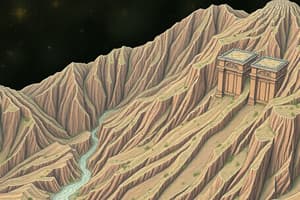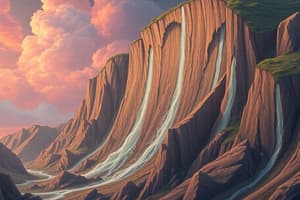Podcast
Questions and Answers
What is Mass Wasting / Mass Movements?
What is Mass Wasting / Mass Movements?
The downslope movement of earth materials under the influence of gravity.
How are mass movements classified?
How are mass movements classified?
Types of movement, type of earth material, amount of water present, rate of movement.
What is creep in geology?
What is creep in geology?
Slow downhill movement of regolith.
What is solifluction?
What is solifluction?
What is slumping?
What is slumping?
What are the types of mass movement?
What are the types of mass movement?
What is a rockslide?
What is a rockslide?
What defines an avalanche?
What defines an avalanche?
What are rockfalls?
What are rockfalls?
What are submarine mass movements?
What are submarine mass movements?
Why do mass movements occur?
Why do mass movements occur?
What are downslope forces?
What are downslope forces?
What are resisting forces?
What are resisting forces?
What factors determine slope stability?
What factors determine slope stability?
What is the angle of repose?
What is the angle of repose?
What does climate refer to in geology?
What does climate refer to in geology?
How does water affect slope stability?
How does water affect slope stability?
What are triggers of mass movements?
What are triggers of mass movements?
How can we protect against mass movement disasters?
How can we protect against mass movement disasters?
Flashcards are hidden until you start studying
Study Notes
Mass Wasting Overview
- Mass wasting, or mass movements, is the downslope movement of earth materials driven by gravity.
- Occurs continuously on slopes and includes phenomena like landslides.
Classification of Mass Movements
- Classified by type of movement, earth material, water content, and movement rate.
Creep
- Slow downhill movement of regolith caused by seasonal expansion and contraction.
- Influenced by processes like wetting/drying and freezing/thawing.
- Grains move perpendicular to the slope during expansion and vertically down by gravity during contraction.
Solifluction
- In tundra regions, melted permafrost flows over deeper frozen soil, creating solifluction lobes.
Slumping
- Involves sliding of regolith in coherent blocks along a spoon-shaped failure surface.
- Characterized by distinctive features like head scarp and toe.
- Common along seacoasts and riverbanks; can develop slowly, allowing observation.
Types of Mass Movements
- Includes mudflows, debris flows, and lahars, which are water-rich movements.
- Speed influenced by water amount and slope angle; able to carry large objects.
Rock and Debris Slides
- Sudden downslope movement classified into rock slides (rock only) and debris slides (primarily regolith).
- Movement can exceed speeds of 300 km/h due to air cushioning.
Avalanches
- Form turbulent clouds of debris and air, occurring when oversteepened snow detaches.
- Move with immense force, posing severe risks to all in their path.
Rockfalls and Debris Falls
- Involve vertical freefall of bedrock or regolith, which fragments upon impact.
- Talus blocks accumulate at the slope base.
Submarine Mass Movements
- Often preserved by burial, include submarine slumps, debris flows, and turbidity currents.
- Can be of significant size and impact.
Causes of Mass Movements
- Result from weathering of rock surfaces and instability of slopes.
Slope Stability
- Determined by the balance between downslope forces (gravity, weight of materials, water) and resisting forces (material strength, cohesion, friction).
- Steeper slopes increase risk due to larger forces.
Driving Forces
- Gravity is the primary driving force pushing material downhill.
Resisting Forces
- Shear strength is crucial for preventing slipping.
Factors Influencing Slope Stability
- Type of material, slope angle, topography, climate, water, and time.
Angle of Repose
- The maximum angle at which loose material can rest without failing.
Climate Impact
- Weather patterns over years influence slope conditions; arid regions expose more bare rock, while wet regions support more soil and vegetation.
Role of Water
- Water saturation increases slope weight, lubricates grain contacts, can erode hill bases, and cause liquefaction.
Triggers of Slope Failure
- Events like shocks, vibrations, and changes in slope can destabilize areas; both natural and human-induced triggers exist.
Protecting Against Disasters
- Geologic mapping can identify risk zones.
- Strategies include re-vegetation, regrading slopes, drainage to reduce weight, and engineered structures to enhance stability.
Studying That Suits You
Use AI to generate personalized quizzes and flashcards to suit your learning preferences.




